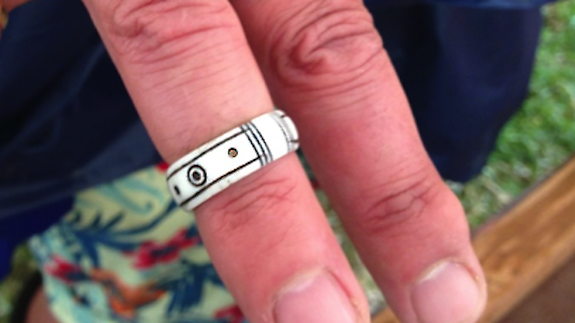Hart of Ely

Craft has always been an important part of community networks and groups, and in the past deer antler was a key material for creating objects of use and of beauty.
Throughout 2017, the ‘Hart of Ely’ project used the art of making to take archaeology out to local communities.
Team members worked with the Men in Sheds group at Ely and Action in Caerau and Ely (ACE) to create copies of ancient items, from simple antler rings to complex composite Viking combs. This project was a community based collaborative exploration of our ancient and modern relationship with crafts, craft skills and craft materials, and provided a new pathway for people to engage with the cultural and natural heritage of Wales.
The series of workshops was designed to:
- develop participant skills and creativity
- produce keepsakes and items for demonstration and experimentation
- promote skill-sharing and informal learning between all participants, both community and academics, and form the basis of participatory research into the acquisition of expertise
- develop a broader awareness of Welsh heritage and cultural history.
The workshops drew equally upon both university and community-held skills and knowledge, and involved both skilled and unskilled individuals.
The project commenced with two ring making workshops for members of the Men in Sheds group - and for a number of interested passers-by! New creative relationships with this ancient craft material are emerging as we explore how artefacts were made, and participants and project partners are benefiting through mutual learning and the inclusive nature of the activities. Working with antler is developing new knowledge about this ancient material and the role of deer in the past, as well as a wider interest in the pre/history of Wales (and Britain as a whole), and in modern deer welfare and conservation.
Subsequent workshops have focused on creating flat blanks or plates from antler, which are versatile basic pieces for the construction of objects like combs. Participants have developed their enthusiasm for and skills in antler-working, using Viking hand tools and learning to write in runic alphabets. And as word has spread about the course, more members have been drawn into the group.
On 8 July 2017, in partnership with the CAER Heritage Project and Phil Jenkins from Dusty Shed, Hart of Ely took a stand at the Ely Festival, where interest in the made objects was strong. Using displays of artefacts and ring- and pendant-making demonstrations, the team shared their knowledge with over 480 people. Recognising the economic value of antler-working, the Men in Sheds group are now considering adding antler objects to the products which they manufacture to support the group.
Members of the group and the wider community also took part in a three-day experimental archaeology weekend on the Gower. Free to attend for participants, and adapted to accommodate a range of abilities, the weekend saw participants engage with many aspects of prehistoric life, from fire lighting, to shelter construction, and from flint knapping to deer skinning, bronze casting and cooking with wild food.
In a further benefit to community members and Cardiff researchers, members of Ely's Men in Sheds group have since visited Men in Sheds Bridgend, whose members benefited from a skills sharing workshop. Together with three Men in Sheds members, the Hart of Ely team is continuing to develop a learning package for people with diverse needs, working with community groups including Cardiff Solace dementia support group and the RNIB.
Contact
Further details about the Hart of Ely project, about antler-working and its uses, and about the types of deer found in the British Isles, are available on the Guerilla Archaeology blog, together with how-to pages to allow people to create their own antler-objects.
For more information please contact:

Professor Jacqui Mulville
Professor in Bioarchaeology, Head of Archaeology and Conservation
- mulvilleja@cardiff.ac.uk
- +44 (0)29 2087 4247